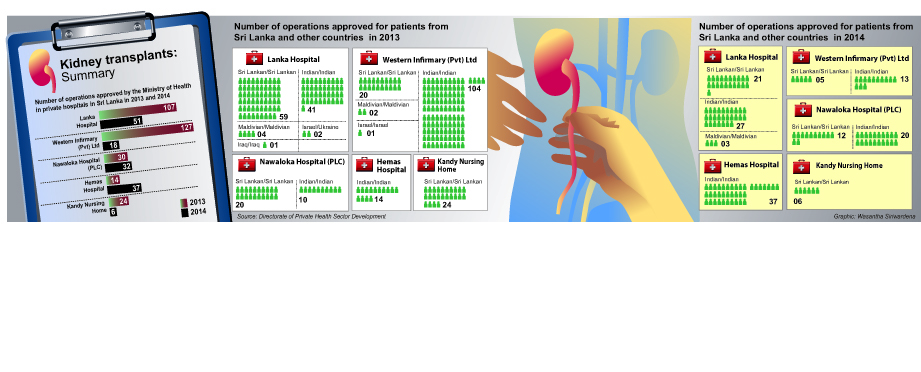News
Kidney trade: Raid on private hospitals
A top Health Ministry team is to visit several private hospitals this week to check out what is happening at ground level, following allegations of irregular kidney transplants on foreigners.
The two-member team from the Directorate of Private Health Sector Development will comprise its Director Dr. Kanthi Ariyaratne and Deputy Director Dr. A.I. Jagoda.

Dr. Kanthi Ariyaratne
Indian media have reported that poor Indians are being coerced to donate their kidneys for a fee and to circumvent the stiff regulations prevailing there, the donors and recipients are brought to Colombo for transplants, under a well-organised racket. The exposure came after anIndian youth who allegedly came here to donate a kidney died of a heart attack in Colombo after a drinking spree.
The private hospitals in Sri Lanka which usually submit applications to the Directorate for kidney (renal) transplants on both locals and foreigners are Lanka Hospital, Western Infirmary (Pvt) Ltd., Nawaloka Hospital and Hemas Hospital, all based in Colombo and the Kandy Nursing Home. (See graphic)
The Directorate has submitted details of files approved with regard to kidney transplants in private hospitals in 2013 and the first four months of 2014 to the Health Ministry, as part of an ongoing investigation into the alleged racket, it is learnt.
The two-member team will look into the finer details of how often the Ethical Clearance Committees – a requirement in hospitals performing transplants – meet and how informed consent is taken from both the donor and the recipient. It will also hold discussions with the Transplantation Coordinators and surgical teams performing such transplantations at these hospitals.

Dr. Lakshmi Somatunga
In view of the allegations emanating from India, mainly through its media, the Directorate is also suggesting certain preventive measures. They include:
n An independent Ethical Clearance Committee to approve all transplantations.
n Until the above suggestion is taken up and a decision is made, to make way for a Health Ministry official to sit as an observer when the private hospitals’ Ethical Clearance Committees meet to decide on transplants.
n Coordination at government level between Sri Lanka and the country from which these donor-recipient couples are arriving. (Citing an example, Dr. Ariyarathne said that in the case of a few Maldivians, this is how it happened. Getting authentication from the Indian government would to a large extent help cut out alleged corruption. This would be of particular relevance in the case of India which has tightened its transplantation laws after a series of scandals there involving kidney sales.All organ transplantations in Sri Lanka fall under the Transplantation of Human Tissues Act, No. 48 of 1987, explained Dr. Ariyarathne, adding that each organ transplant is authorised by the Director-General (DG) of Health Services, Dr. Palitha Mahipala.
The Act stipulates that “any sale, dealing in or disposal of a body, or any part or tissue thereof is prohibited”.
In recent times, Sri Lanka has ventured not only into kidney transplants but also liver and one lung transplant, the Sunday Times understands.
With rapid changes in this field, the Health Ministry has seen the need to re-look at the Act, said Dr. Ariyaratne.
Referring to kidney transplants which have hit the headlines recently, she said that the ‘donors’ fall into three categories:
n Kidneys from deceased or brain-dead donors (cadavers) – the guidelines for such donations are being processed so as to ensure that the most needy but matching recipient would get the organ. This is mainly in the government sector.
n Donors who are related to the recipients – these are ‘live’ transplantations where a donor gives a kidney to a recipient who is a blood or immediate relative.
n Altruistic donors – these are also ‘live’ transplantations where a donor “with love and affection” decides to donate a kidney to a recipient who is not a relative.
Conceding that ensuring that no money changes hands in the third category is a difficult task, Dr. Ariyarathne is categorical that the Ethical Clearance Committees are essential within hospitals performing transplant surgery. These committees should not have any members who are part of the transplant team, she stressed, pointing out that the Directorate insists that they provide the names of the members of these committees.
While dealing with only the person designated by the private hospital with regard to transplants, the Directorate has a check-list of all the documents that the private hospitals need to submit when seeking permission for a transplant. It includes informed consent from both the donor and the recipient, another document where a doctor has explained all the risks of transplantation to the donors, a certified copy of the donor’s birth certificate and an affidavit with both the photographs of the donor and the recipient. A letter of referral from a doctor in that country to the specific Sri Lankan private hospital where the transplantation is to take place is also required, the Sunday Times learns.
The Directorate has rejected files where the doctor’s letter states in general terms that transplantation is to take place in Sri Lanka, without mentioning the hospital, according to Dr. Ariyaratne.
“All donors need to be over 21 years of age,” she says, “and we establish that before recommending the approval of a transplant.”The process when a file is submitted seeking permission for a transplant in the private sector is for the Directorate to screen it carefully and then send it to the Deputy Director-General (Medical Services) 2, Dr. Ananda Gunasekera, with a recommendation, which could be positive or negative. He too scrutinises it and then submits it to the DG with his recommendation. The DG will then approve or reject the transplant based on these recommendations. This process usually takes about six to eight days, the Sunday Times learns.
Dr. Ariyaratne said the Health Ministry in 2011, after exhaustive discussions, halted Sri Lankans donating kidneys to foreigners. This followed a disclosure at an international conference that someone had “bought a kidney from a Sri Lankan” and had a transplantation here. Up to that time Sri Lankans were “donating” their kidneys not only to other Sri Lankans under the “altruistic” clause but also to Maldivians and Israelis. With fears of human organ trafficking, the Health Ministry held discussions with Nephrologists and Transplant Surgeons before stopping Sri Lankans from donating kidneys to foreigners.
Thereafter, foreigners had to bring their own donors. But that too posed many challenges as some Israelis then began claiming that their kith and kin were all over the world, bringing “relatives” from Latvia, Ukraine etc, it is learnt. A couple of Indian-recipients living outside India had brought donors from India, compelling the authorities to enforce the condition that the donor-and-recipient ‘couple’ should be from the same country, it is learnt.
“We have received no complaints of organ selling. It is important for Sri Lanka to have ethical medical tourism but if there is an inkling that organs are being bought and sold, we will not hesitate to crack down,” Dr. Ariyaratne assured.
| One database for transplants the aim
Dr. Lakshmi Somatunga, the Deputy Director-General (Medical Services) 1, said that the National Programme for Kidney Transplantation in government hospitals is being coordinated by her since 2012. Her unit is working towards organising a single database for such transplantation. “Preliminary work is now over and we hope to implement it within a year,” she said, adding that the National Transplant Advisory Committee has been revived and a Steering Committee appointed by the DG to look into matters relating to transplants. With regard to kidney transplantation in the government sector, she said that they are being performed at the National Hospital; the Institute for Nephrology, Dialysis and Transplantation, Maligawatte; the Kandy Teaching Hospital; the Peradeniya Teaching Hospital; the Karapitiya Teaching Hospital; the Anuradhapura Teaching Hospital; and the Sri Jayewardenepura Hospital. The Colombo North (Ragama) Teaching Hospital is performing only liver transplants. |


